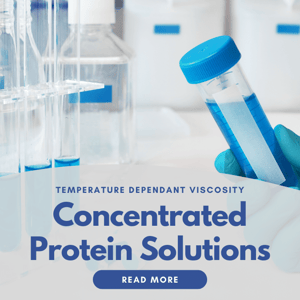
DNA Condensing Agent Effects on Viscosity
Application Note Download
The deoxyribonucleic acid (DNA) is a charged polymer that has a double helix structure composed of two single strands wound around each other that carries the genetic information of living systems.

DNA can undergo a conformational transition to a condensed (collapsed) structure in the presence of condensing agents that leads to structural changes and a reduction in the effective volume of the DNA molecule. Condensing agents can change the rheological properties of DNA and can be used for a variety of applications, including gene therapy, gene regulation and cell division.
In this application note, we show the effect of condensing agents on the viscosity of calf-thymus DNA (CT-DNA) solutions with a temperature sweep experiment using the VROC® initium one plus automated viscometer. Sigmoidal fits of the relative viscosity vs. temperature were used to obtain the melting temperature at multiple DNA concentrations.
Fill out the short form to the right to download the full Application Note!
.jpeg?width=300&name=Woman%20scientist%2c%20documents%20and%20hands%20writing%20_575258496-min(1).jpeg)


.png?width=200&height=58&name=RheoSense%20Logo%20(REGISTERED).png)



